

Pourquoi l’intelligence émotionnelle est devenue plus importante que l’intelligence cognitive (Q.I.) Vous savez à quoi on peut être certain qu’on a pris de l’âge ?
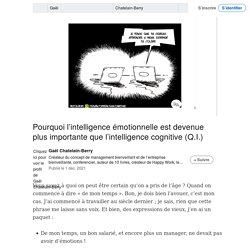
Quand on commence à dire « de mon temps ». Bon, je dois bien l’avouer, c’est mon cas. J’ai commencé à travailler au siècle dernier ; je sais, rien que cette phrase me laisse sans voix. Et bien, des expressions de vieux, j’en ai un paquet : De mon temps, un bon salarié, et encore plus un manager, ne devait pas avoir d’émotions ! Bref, de mon temps, l’humain avait un tantinet disparu derrière les chiffres, les résultats, la performance à tous prix. Mais cette entreprise était loin d’être la seule dans ce cas et la Qualité de Vie au Travail n’est devenue une réalité en France que depuis cette vague de suicide. Oui, de mon temps, l’intelligence émotionnelle n’avait pas sa place, et il suffit pour s’en convaincre de relire les minutes de ce procès et les déclarations de son PDG pour s’en convaincre. Mais ce procès n’explique pas tout, loin de là. 1- L’exigence des salariés Est-ce que cela existe encore ?
Réponse : 5 minutes. LinkedIn by Sean McPheat. Don't Leave Emotions Out. 5 Components of Emotional Intelligence. LinkedIn by Sean McPheat. LinkedIn by Annapurna A. Change Management and Emotional Intelligence. Emotional Intelligence Gaps Across the Generations. Emotional intelligence is the ability to accurately acquire data from feelings and to effectively use that data to solve problems.
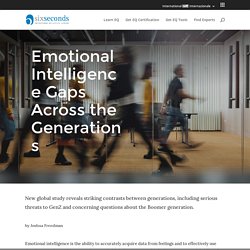
In other words, it’s being smarter with feelings — an essential skillset for building healthy relationships & teams, negotiating, and leading self & others. EQ, or emotional quotient, is the measure of emotional intelligence. Overall EQ declined sharply in 2020, but that’s just the tip of the iceberg. In a diverse and changing world where people of all ages need to find new ways to work together, there’s great value in going “below the tip of the iceberg” toward deeper understanding. While some aspects of generational difference might be simply due to age, the pandemic offers a unique lens to see how generational differences can form.
LinkedIn by Sean McPheat. Sympathy & Empathy Are Not The Same- Here's Why It Matters For Leaders. 20 ways to improve your emotional intelligence. Six Seconds, The Emotional Intelligence Network. The One Book That Pulled Microsoft Back From the Brink (Satya Nadella's Ultimate Leadership Flex) When Satya Nadella stepped in to replace Steve Ballmer as Microsoft's CEO, he had a huge undertaking in front of him.
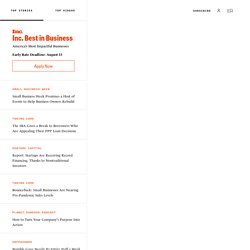
Nadella had to take an aging, stagnant behemoth of an organization, notorious for its infighting among senior leadership, and transform it into a respected and innovative technology and business brand. That's the Microsoft we know today. The market leader Microsoft. The award-winning Microsoft. The everyone-wants-to-work-for-Microsoft Microsoft. But it wasn't always so. Fortunately, Nadella's entrance was to change the course of success for the organization. Why Emotionally Intelligent Leaders Embrace the Ikea Effect. In the early 1950s, the pioneering motivation researcher Ernest Dichter told General Mills to stop using powdered eggs in their Betty Crocker cake mixes and have homemakers use fresh eggs instead.
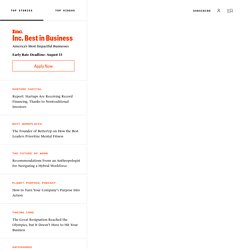
Why? Taste mattered, but so did the underlying psychology. Cracking a few eggs and spooning in a little vegetable oil made the cake maker feel more engaged. Empathetic Leadership vs. EQ – Which Is More Valuable? What is empathetic leadership and how does it differ from EQ, emotional management, and other leadership skills?
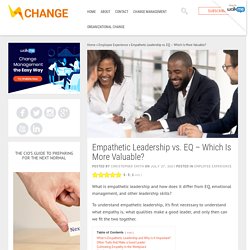
To understand empathetic leadership, it’s first necessary to understand what empathy is, what qualities make a good leader, and only then can we fit the two together. What Is Empathetic Leadership and Why Is It Important? An empathic person can feel and understand what others are feeling. It is an emotional quality that can be very valuable for leaders, for several reasons: Ultimately, empathetic leadership can contribute to an improved workplace, which, in turn, can improve the organization’s culture.
Other Traits that Make a Good Leader. Global Emotions Report. The 7 Emotional Phases Employees Go Through During Change. When people within an organization are required to change, it is common for them to emotionally identify with the current state.
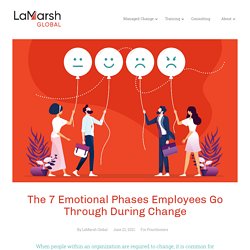
The idea of change can trigger an emotional response. Even before a change is initiated, employees and leaders may feel personal loss, concerns about what will be required of them and apprehensions over their ability to meet any new expectations. Common reactions to change include a desire to keep things the same and little confidence that the change will be successful and solve real problems. These reactions are a reflection of the emotional phases that employees go through during change. Eight Educational Experiences with Emotions.
I am feeling joy.I am feeling encouraged.I am feeling… grateful.
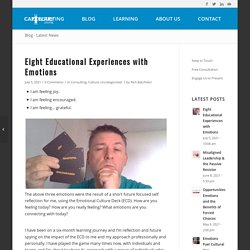
The above three emotions were the result of a short future focused self reflection for me, using the Emotional Culture Deck (ECD). How are you feeling today? How are you really feeling? What emotions are you connecting with today? I have been on a six-month learning journey and I’m reflection and future spying on the impact of the ECD to me and my approach professionally and personally. On demand webinar: Building Your Emotional Intelligence in Times of Change and Uncertainty. Podcast: The What, How, and Why of Emotional Intelligence. Is Your Emotional Intelligence Authentic, or Self-Serving? It’s possible to fake emotional intelligence. Well-intended leaders can go into interactions armed with what they believe is a combination of deep empathy, attuned listening, and self-awareness but is, in fact, a way to serve their own emotional needs. There are... It’s possible to fake emotional intelligence.
Similar to knockoffs of luxury watches or handbags, there are emotions and actions that look like the real thing but really aren’t. With the best of intentions, I’ve seen smart leaders charge into sensitive interactions armed with what they believed was a combination of deep empathy, attuned listening, and self-awareness but was, in fact, a way to serve their own emotional needs.
Why Emotionally Intelligent People Embrace the 25-5 Rule. Tell me if the following sounds familiar: You're working on a major project.

In the beginning, you're excited--you know this "thing" is going to be great. But as the months go by, the project never gets finished. In fact, it's not progressing nearly at the rate you want it to, even though you've established it as your number one (work) priority. So, why aren't you further along? The short answer: Because you keep getting distracted. Maybe it's the countless meetings that keep getting in the way. Let me just do these other things first, because they're quick and easy--or because they're more fun. Six Seconds, The Emotional Intelligence Network. The SEI LTC is an essential assessment tool for today’s world.
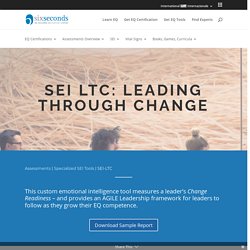
Everyday leaders find themselves navigating levels of uncertainty and complexity at a pace seldom seen before. How do you CHANGE your PATTERNS? Recognize patterns and the BRAIN SCIENCE of emotions. The four dimensions of our emotional DNA. State of the Heart 2021 - The global benchmark for emotional intelligence. How to regulate emotions. How Did the Pandemic Impact People’s Emotional Intelligence? 3 Key Insights - New Research.
The emotional intelligence skill that saw the biggest decrease in 2020?
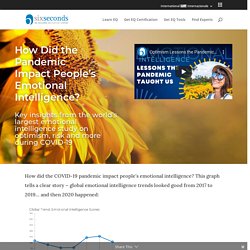
Exercise Optimism, which is defined as the ability to see options. It went down 5%. And, as we reported about the future of work, related skills like collaboration, imagination, and risk taking all saw declines of more than 10% globally (2021 State of the Heart study). Looking at the neurobiology, this decline makes sense. When we feel stress, we are biologically programmed to be less creative, less compassionate, less visionary.
There are, however, two big problems with this trend: The first is that our stress response system evolved to deal with tangible, temporary threats – like a tiger stalking you in the jungle – not long-term existential threats. The second problem is that optimism is really important. Emotional Intelligence Facts - How many do you know? LinkedIn by Simon Sinek Inc. Emotional Intelligence for Managers: How to Develop Emotional Intelligence. An Article by Sam, Management 3.0 Team Member and creator of the Management 3.0 Emotional Intelligence Module Many of you might have already heard about Emotional Intelligence (EQ), it is ‘all the rage’ these days, especially as the world moves to remote working where we need to be even more in tune with ourselves and those around us.
In this article you’ll learn: There are several ways to develop and increase EQ, before we dive in, let’s briefly dissect what EQ is: What is Emotional Intelligence? Emotional intelligence the ability to understand and manage your own emotions, and those of the people around you. Self-ReflectionSelf-RegulationEmpathy Someone who has strong self-reflection for example, would be able to stop themselves in a heated conversation, from saying something they’d regret later. On toxic positivity and real empathy. Are you emotionally self aware? 4 Steps to Practice Empathy from Dr. Brene Brown. Why we all need to practice emotional first aid.
How to develop emotional intelligence in the workplace. Leaders fail for a variety of reasons. It might be due to an inability to adapt to change or think strategically. Perhaps they struggle to develop good working relationships with key stakeholders or build and maintain a team. What we have come to know is that emotional intelligence, or EI, is the No. 1 predictor of professional and personal excellence and it accounts for 58 percent of performance in all job types. Additionally, 90 percent of top performers in organizations have higher levels of EI, making it a critical factor for leadership success. Integration of this critical leadership competency is quickly becoming a requirement for leaders. All of this is easier said than done. Become more self-aware. Change Management Review. As a profession, why do we approach major change rationally? We create the “case for change,” articulating all of the reasons that maintaining the status quo is not viable, and all the reasons that this new status quo is the solution.
We establish detailed change execution plans, guided by methodology and rationally thought out. We (rationally) provide training for the changes in behavior that people will be expected to make. Emotional pyramid of needs. Six Seconds, The Emotional Intelligence Network. The Many Messages of Fear The reason we have fear is to protect from danger. Fear serves as a warning: Something you care about is at risk. Often we’re not sure what it is we care about (exactly) and what risk we’re perceiving (exactly). Then fear turns into anxiety, a generalized feeling of stress, and it becomes nearly impossible to pinpoint the perceived challenge.
On the other hand, when we can identify the source of the fear, we get insight. In a change, there are many possible causes of fear. Fear of the unknown – the message is to identify more options of what could happen next.Fear that the team will not function well – the message is to clarify who is remaining in the team and reconnecting with them.Fear that people will react in a negative way – the message is to plan communication that is empathic and supportive. Rather than shutting down fear, acknowledge that it’s the “right” feeling to have in the change process, and listen to it. Emotions are complex and many. Leadership Influence: Controlling Emotional Contagion. Wharton@Work Nano Tools for Leaders® are fast, effective leadership tools that you can learn and start using in less than 15 minutes — with the potential to significantly impact your success as a leader and the engagement and productivity of the people you lead.
The Goal Create an environment, whether in person or virtual, that enhances employee engagement and performance by paying attention to the emotional contagion occurring in your team. Nano Tool Employees are not emotional islands. As a leader, controlling emotional contagion, especially during the pandemic, should be a priority. Want to Improve Emotional Intelligence? This Simple Trick Actually Works. The 7 characteristics of emotionally intelligent people. LinkedIn by Susan David. How to Prevent the Return to Offices From Being an Emotional Roller Coaster.
As more and more people get vaccinated against COVID-19, leaders and employees are starting to look ahead to a potential return to offices. Many organizations are considering a hybrid work model, in which teams come into the office a few days a week or a few key days a month. For employees who have felt isolated and siloed during the pandemic, the return to the workplace will be exciting.
LinkedIn by Annapurna A. How to CHANGE with Emotional Intelligence - Video Series. The Emotional Pyramid of Needs. Six Seconds, The Emotional Intelligence Network. On emotional intelligence. Six Seconds, The Emotional Intelligence Network. What Does Practicing Emotional Intelligence mean? From Theory to PRACTICE. How to feel your feelings. On the three different emotional states.
Using Emotional Intelligence to Change the Unchangeable. For over 150 years, the Internal Revenue Service has collected tax revenue within the United States. Originally created by Abraham Lincoln in 1862 as a method to pay war expenses, the IRS has collected taxes on personal incomes of Americans to finance various government activities. Wars and Presidents have changed over the last 160 years, but one thing has never changed – the method in which taxes are collected. “What” has been taxed has changed – whether payroll withholding, personal income, income surtaxes, consumption, etc., but the method has always remained the same in that IRS agents have always conducted manual, paper audits. In 2017, that finally changed. The IRS audit process is considered the largest and highest revenue producing process in the world. Now, imagine trying to change that process. “Taxpayer Digital Communications”, or TDC, is a new program where the goal is to transform the audit process from analog (paper) to digital.
Channeling Outrage into Purpose-Driven Action. On labeling emotions in a granular way. How Leaders Can Optimize Teams’ Emotional Landscapes. Already a member? Sign in. Emotions skills: More than a feeling. L’outil secret des meilleurs gestionnaires : l’intelligence émotionnelle. Pour bien vivre ses relations avec autrui, il est impératif de savoir gérer son propre vécu. What People (Still) Get Wrong About Emotional Intelligence. Emotional Intelligence Is Key to Strong Leadership. Here’s How to Sharpen Yours.
The issue: he had terrible back pain and walking helped. The cycle of acceptance. On emotional intelligence in a nutshell. ANGRY about EVERYTHING - Why am I so angry all the time? People Who Confuse These 3 Simple Words Have Very Low Emotional Intelligence. This is a story about three related words that people often confuse, to their detriment. It's an understandable mistake if they haven't taken the time to study the differences, because all three concepts generally fall under the umbrella of positive feelings that people express in response to the experiences of others. How to get LEADERS to buy into Emotional Intelligence.
What is the relationship between emotion and storytelling? DATA for CHANGE management: Emotional Intelligence test in the workplace. Using Emotions to Leverage and Accelerate Change: A Guide for Leaders. Six Seconds, The Emotional Intelligence Network. How emotional intelligence helps us not get overwhelmed. Plutchik's Wheel of Emotions: Explore the Interactive Feelings Wheel. 13 Signs of High Emotional Intelligence. Understanding differences between EMOTIONS FEELINGS and MOODS - episode 04. Emotional Intelligence Training for Business: Best Practices for Success. EQ vs IQ: What is more important? Emotional Intelligence Explained #3. Emotions with Andrea Garfield & Awesome Institute. Podcast: On change communication, equanimity and busting silos. Vu d'ici... Les habiletés émotionnelles des cadres et des dirigeants. 10 Extremely Common Phrases Emotionally Intelligent People Avoid. ‘Feelings Wheel’ Will Help You Better Describe Your Emotions.
Managing Stress and Emotions When Working Remotely. Avez-vous pris votre température émotionnelle ce matin? Feeling Pain to Clarify Purpose: What Can COVID-19 Teach Us About the Climate Crisis? Empathy Starts with Curiosity. Do You Have High Emotional Intelligence? Take This 2-Minute Quiz to Find Out. Emotional Change Curve - Covid19. If You Can Truthfully Say 'Yes' to Any of These 5 Questions, Your Emotional Intelligence Is Lower Than You Think. 7 emotional self-care habits you should develop at work. Chiefs Quarterback Patrick Mahomes Used a Simple 5-Word Phrase to Save His Team's Season. The Top 5 Things Leaders Should Know About Emotional Intelligence. Emotional and Social Competence Inventory (ESCI) Employee Emotions Aren’t Noise — They’re Data. Take This 5-Minute Test to See if You Have High Emotional Intelligence.
Logic Isn't Enough Addressing the Emotional Side of Change Management. Innovation and Emotional Intelligence. Change Management Review. Emotional Intelligence Has a New Cousin. Here's Why You Need It. 15 Signs You're Emotionally Intelligent (Without Even Knowing It)